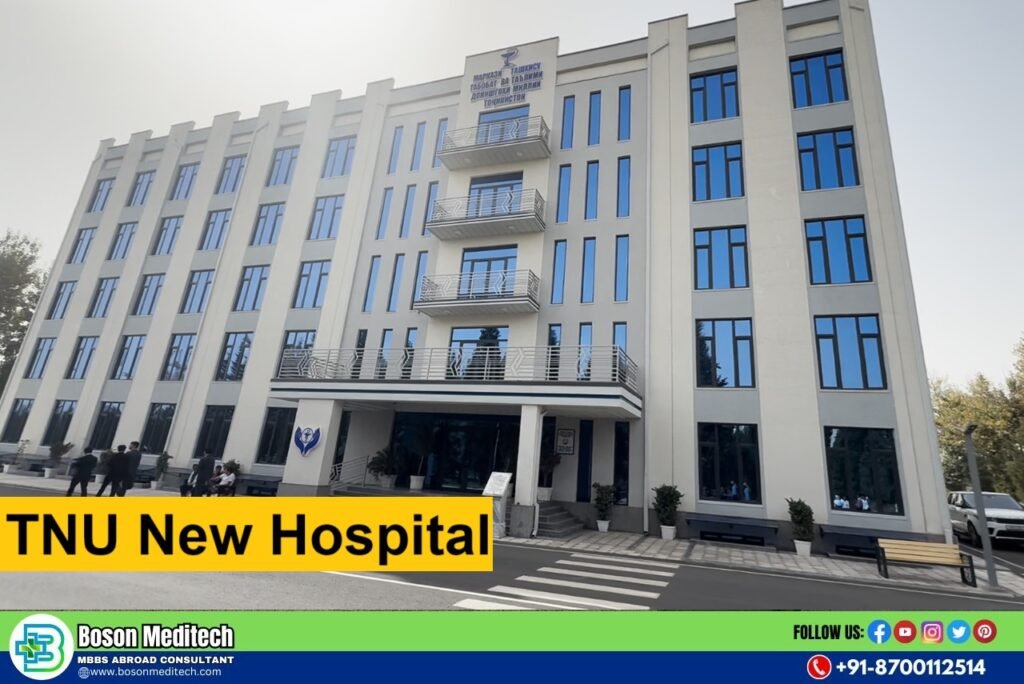
Tajik National University 2025 Overview
| Tajik National University, Tajikistan | |
| Address | Rudaki Avenue 17, Dushanbe 734025, Tajikistan |
| Country Ranking | 1 |
| World Ranking | 8156 |
| Established in | 1947 |
| Recognition | WHO, ECFMG, FAIMER and Ministry of Tajikistan |
| Official Website | https://tnu.tj/index.php/en/main/ |
| Eligibility | 50 % in Physics, Chemistry and Biology |
| NEET | NEET Qualification is Mandatory |
| Tuition Fees | $4500 |
| Hostel Charges | $500 |
| Cost of Living | 10,000-15,000 INR monthly |
| Course Duration | 5+1 (MBBS + Internship) |
| Medium of MBBS Course | English |
| Near By Prominent Places | Dushanbe International Airport 7 Kms
Presidential Palace at 3 Kms Indian Embassy at 3.5 kms |
Founded in 1947, Tajik National University (TNU) is located in Tajikistan. It was originally the Tajik State Pedagogical Institute, it evolved over time to become a comprehensive university in 1951. Tajik National University has significantly influenced Tajikistan’s educational landscape, contributing to intellectual growth and academic development in the region. Here, you will learn about the total cost to study MBBS at TNU, tuition fee, hostel charges of Tajik National Medical University and also the Tajik National University ranking and other details. Tajikistan MBBS is valid in India as it fulfils the NMC gazette 2021’s criteria and it has also been listed on the website of the Embassy of India in Tajikistan, Dushanbe. Moreover, for the Indian students who would like to study MBBS in Tajikistan at affordable cost and budget, realize that the fee of the Tajik National University is very affordable. This is the reason that from the past couple of years, Indian students have deceided to go to Tajikistan for Medical studies. It is indeed the best university in Tajikistan as it has the Country Rank 1, which says a lot about the quality, infrastrcuture and overall efficiency of the university to accomodate and eduacte the international students from various countries including India.

Here, you will know about the Tajik State University’s MBBS fee structure, ranking, hostel facilities and the admission procedure along with the syllabus and scope /career options.
BOSON MEDITECH CONSULTANT is Official Admission Partner of Tajik National University. CALL Us at +91-8700112514
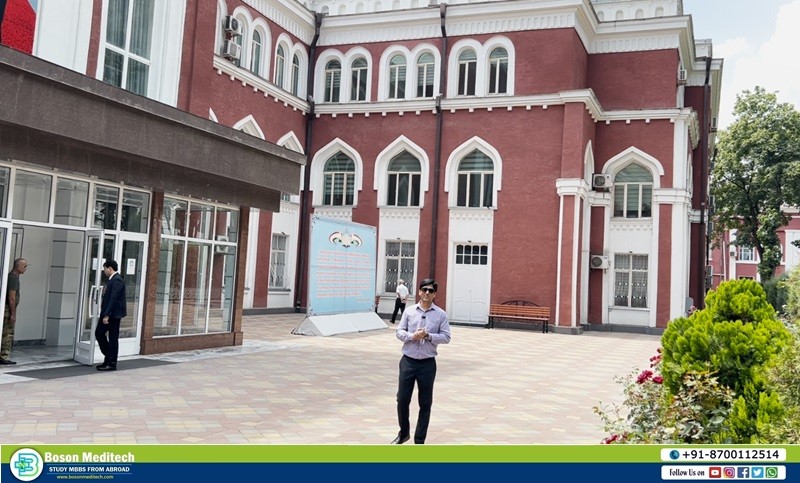
Tajik National Medical University is dedicated to maintaining high standards across various disciplines, offering undergraduate, graduate, and doctoral programs in natural sciences, humanities, engineering, and social sciences. With a faculty comprising esteemed experts, TNU provides students with a stimulating learning environment and exceptional mentorship. The Tajik National university boasts modern facilities to support academic and extracurricular activities. The campus of Tajik National University includes advanced classrooms, fully-equipped laboratories, extensive libraries, and recreational amenities. Tajik National University also offers cutting-edge research facilities, enabling students to engage in practical experimentation and inquiry-based learning for MBBS in Tajikistan at affordable budget.

This No 1 ranked medical college in Tajikistan emphasizes international collaboration, offering students opportunities to participate in exchange programs, joint research projects, and international conferences through partnerships with global institutions. This exposure to diverse perspectives enriches students’ academic experiences and prepares them for success in an interconnected world.
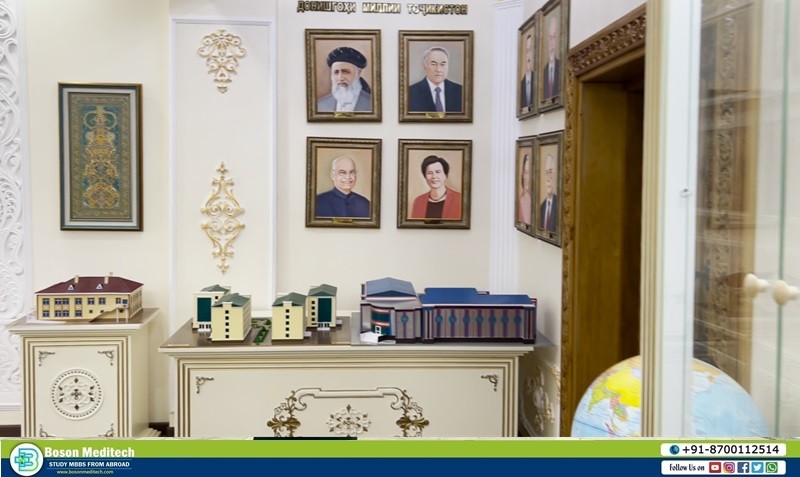
Indian students aspiring to join Tajik National University undergo a straightforward yet competitive admissions process. Applicants must submit academic transcripts, standardized test scores, and other relevant documents. Proficiency in English may be required depending on the chosen program. TNU offers scholarships and financial aid to deserving students, making higher education abroad more accessible. While English is widely spoken at Tajik National University, Indian students can also learn the Tajik language and immerse themselves in local culture. TNU offers language courses and cultural exchange programs to facilitate cross-cultural communication and understanding.
Life at Tajik National University is dynamic, with numerous extracurricular activities and student organizations. From cultural festivals and sports competitions to academic conferences and community service initiatives, Indian students can immerse themselves in Tajik culture, form lifelong friendships, and create lasting memories.
This top rated medical university in Tajikistan is dedicated to the holistic development and well-being of its students, providing academic advising, career counseling, health and wellness programs, and accommodation assistance. Staff members support international students in navigating the challenges of studying abroad and adjusting to life in Tajikistan.

Graduates of Tajik National University are well-prepared for successful careers. The university’s strong academic reputation, coupled with an extensive alumni and industry network, offers graduates opportunities for employment both domestically and internationally. Tajik National University alumni are equipped with the skills and knowledge to excel in their chosen fields.
TNU’s location in Central Asia offers Indian students unique opportunities for exploration and personal growth. Tajikistan’s cultural richness, historical significance, and natural beauty provide a vibrant backdrop for students to immerse themselves in diverse cultures, languages, and traditions.
At the forefront of research and innovation, Tajik National University offers Indian students opportunities to contribute to cutting-edge projects in various fields. Whether in environmental science, archaeology, or technology development, students can engage in meaningful research that impacts society.
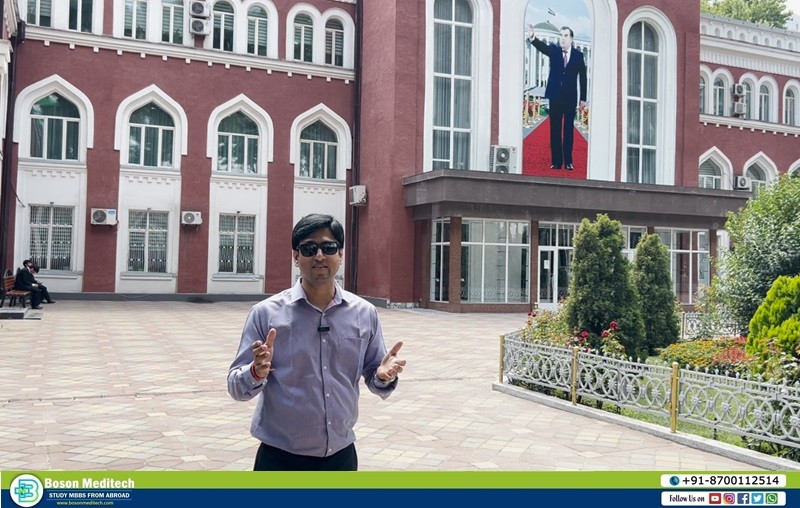
Studying at TNU connects students to a global network of alumni, scholars, and professionals. This network provides valuable resources for career development, mentorship, and collaboration, giving Indian students a competitive edge in the job market. Read more to know why choose Tajik National University to study MBBS in Tajikistan.
Tajik National University encourages social responsibility and civic engagement through community service projects and outreach initiatives. Indian students are inspired to use their education to effect positive change, whether in environmental conservation, education, or social justice advocacy.
Even after graduation, Tajik National University (TNU) continues to be a reliable source of support for its alumni. The TNU Alumni Association organizes networking events, professional development opportunities, and alumni reunions, helping Indian graduates maintain a strong connection with their alma mater and fellow alumni. Whether they are pursuing further education, embarking on a career, or starting a business, TNU alumni can count on the university’s ongoing support and guidance as they navigate life beyond graduation.
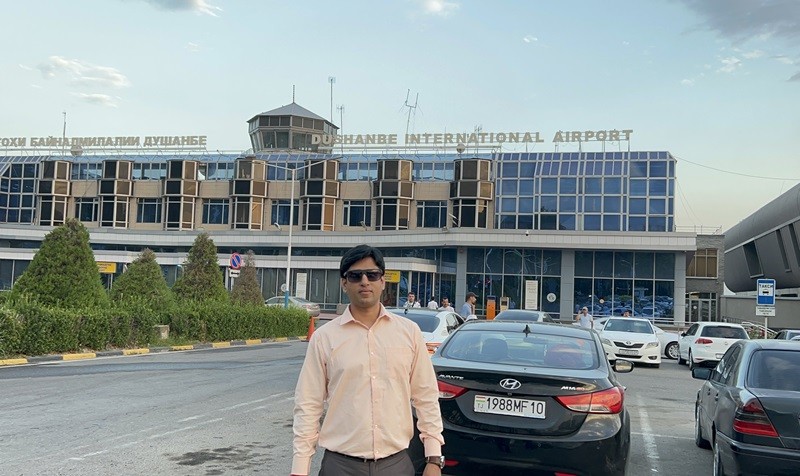
Tajik National University – MBBS Fee Structure 2025-26
The fee structure for Tajik National University for MBBS program is given in the table below:
| 1st Year | 2nd Year | 3rd Year | 4th Year | 5th Year | 6th Year | |
| Tuition Fee | 4500 $ | 4500 $ | 4500 $ | 4500 $ | 4500 $ | 2500 $ |
| Hostel | 500 $ | 500 $ | 500 $ | 500 $ | 500 $ | 500 $ |
| Medical Insurance, Visa Extension | 225 $ | 225 $ | 225 $ | 225 $ | 225 $ | 225 $ |
Total Cost and Budget of Studying MBBS at Tajik National University
The total budget of MBBS from Tajik National University, Tajikistan including the total tuition fees, hostel charges, food charges, and average cost of living and expenses of the student would be 30 Lakhs to 33 Lakhs in Indian Rupees. Fees can be paid semester wise. BOSON MEDITECH CONSULTANT is Official Admission Partner of Tajik National University. CALL Us at +91-8700112514
Tajik National University Address:
Rudaki Avenue 17, Dushanbe 734025, Tajikistan
Tajik National University Website:
Official website of Tajik National University is https://tnu.tj/index.php/en/
Tajik National University Ranking:
Tajik National University World ranking is 5186
Tajik National University Country Ranking: 1

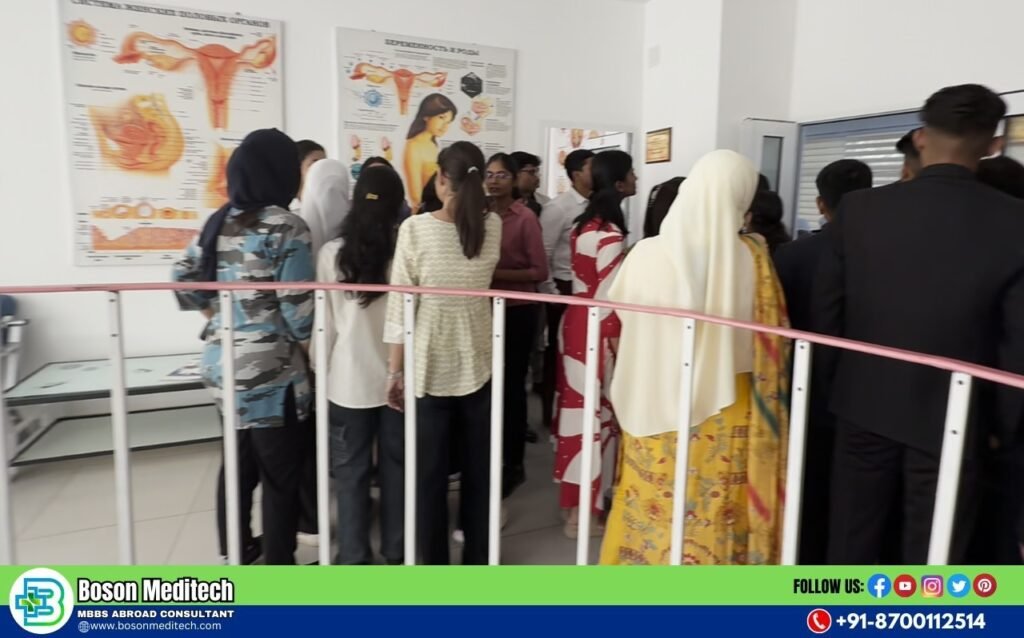
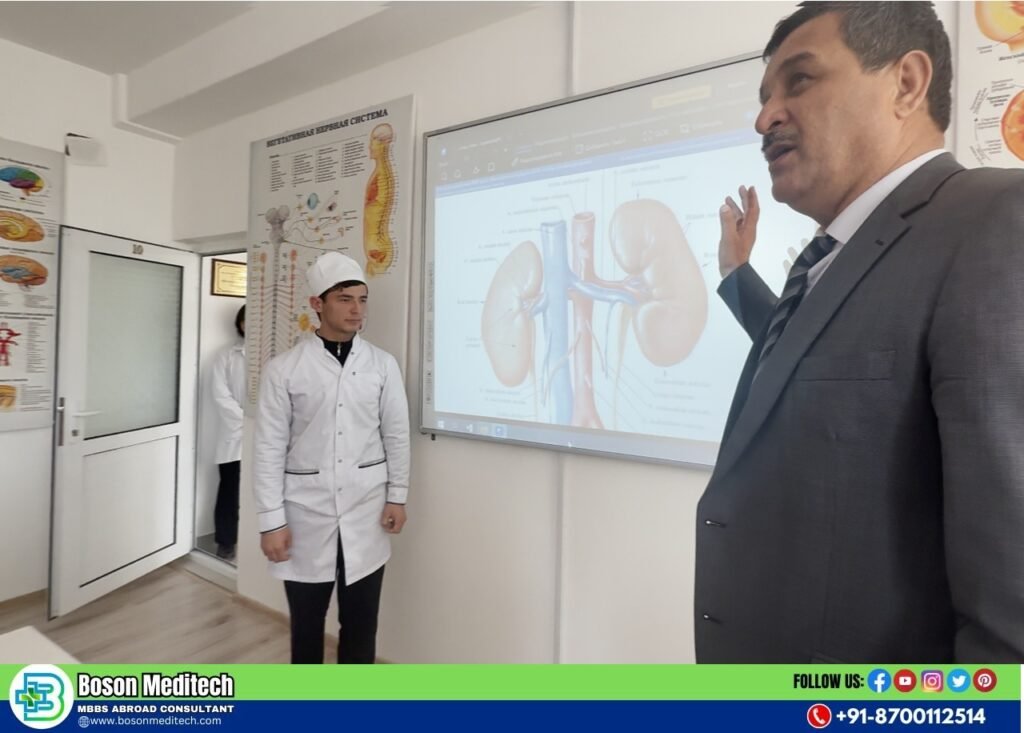
Advantages of Studying MBBS at Tajik National University
- Recognition and Accreditation
Medical Council of India (MCI) Recognition: TNU is recognized by the Medical Council of India, allowing Indian students to practice in India after completing their MBBS without needing additional screening tests.
- Quality Education
Comprehensive Medical Education: Tajik National University provides high-quality medical education with modern teaching methods and infrastructure, ensuring a thorough understanding of medical concepts and practices.
- Affordable Tuition Fees
Cost-Effective Education: Compared to private medical colleges in India, TNU’s tuition fees are relatively affordable, making it an attractive option for quality education at a reasonable cost.
- Low Cost of Living
Economical Lifestyle: Tajikistan offers a lower cost of living compared to many other countries, allowing students to manage their expenses comfortably.
- English-Medium Instruction
No Language Barrier: The MBBS program at TNU is conducted entirely in English, ensuring that Indian students can fully engage with the curriculum.
- Exposure to Diverse Clinical Cases
Practical Experience: Tajikistan’s healthcare system provides students with exposure to a wide range of clinical cases, enhancing their clinical skills and preparing them for real-world medical practice.
- International Faculty
Diverse Teaching Styles: Tajik National University has a diverse faculty of experienced professors and medical professionals from around the world, offering students various teaching styles and perspectives.
- Cultural Diversity
Rich Cultural Experience: Studying at TNU allows Indian students to immerse themselves in a rich cultural environment, fostering cross-cultural understanding and a global outlook.
- Safe Environment
Secure Surroundings: Tajikistan is known for its safety and stability, providing a secure environment for international students.
- Clinical Rotations and Internships
Hands-On Training: Tajik National University facilitates clinical rotations and internships at reputed hospitals and healthcare facilities, giving students hands-on experience under expert guidance.
- Opportunities for Research and Publications
Academic Excellence: Tajik National University encourages research activities and publishing findings in reputable medical journals, fostering a culture of academic innovation.
- Global Recognition
Worldwide Employment Opportunities: A degree from Tajik National University (TNU) is globally recognized, opening doors to employment and further education opportunities worldwide.
- Supportive Student Services
Comprehensive Support: TNU provides support services including accommodation assistance, visa guidance, and counseling, ensuring a smooth transition and comfortable stay.
- Opportunities for Exchange Programs
Global Exposure: TNU collaborates with universities worldwide, offering exchange programs that broaden students’ horizons and expose them to different healthcare systems.
- Preparation for Licensing Examinations
Global Career Flexibility: TNU’s MBBS program prepares students for various licensing exams, including the MCI screening test, USMLE, PLAB, and AMC.
- Networking Opportunities
Diverse Student Body: TNU’s diverse student body fosters lifelong connections and professional networks with peers from various cultural backgrounds.
- Language Proficiency
Enhanced English Skills: Studying in an English-medium environment at TNU improves students’ proficiency in English, a valuable skill for international medical examinations and certifications.
- Clinical Skills Development
Early Practical Training: TNU emphasizes practical training and clinical exposure, helping Indian students develop essential clinical skills early in their medical education.
- Global Perspective
Understanding Global Healthcare: Studying at TNU provides a broader understanding of global healthcare systems, challenges, and best practices.
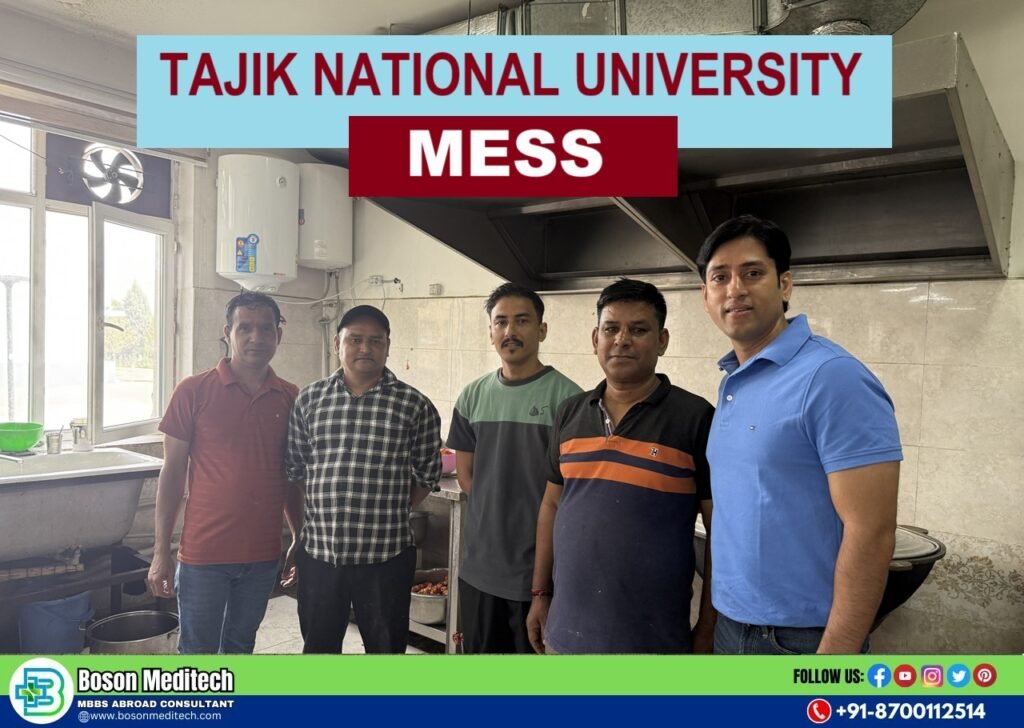
- Cultural Immersion
Personal Enrichment: Living and studying in Tajikistan allows Indian students to learn about Tajik culture, traditions, and customs firsthand.
- Opportunities for Electives and Specializations
Customized Education: TNU offers a range of elective courses and specialization options, allowing students to tailor their education to their interests and career goals.
- Practical Learning Environment
Hands-On Experience: TNU provides ample opportunities for practical learning through clinical rounds, surgical procedures, and medical simulations.
- Extracurricular Activities
Balanced Lifestyle: TNU encourages participation in extracurricular activities, fostering personal growth, leadership skills, and a balanced lifestyle outside academics.
Duration of MBBS at Tajik National University for Indian Students
Studying medicine requires perseverance, dedication, and a profound commitment to the well-being of others. For Indian students aspiring to pursue a medical degree abroad, Tajik National University (TNU) in Tajikistan is an excellent choice. With its rich academic heritage and commitment to excellence, TNU offers a comprehensive MBBS program that meets the highest international standards. Here, we explore the duration, curriculum, and experiential learning opportunities available to Indian students at TNU.
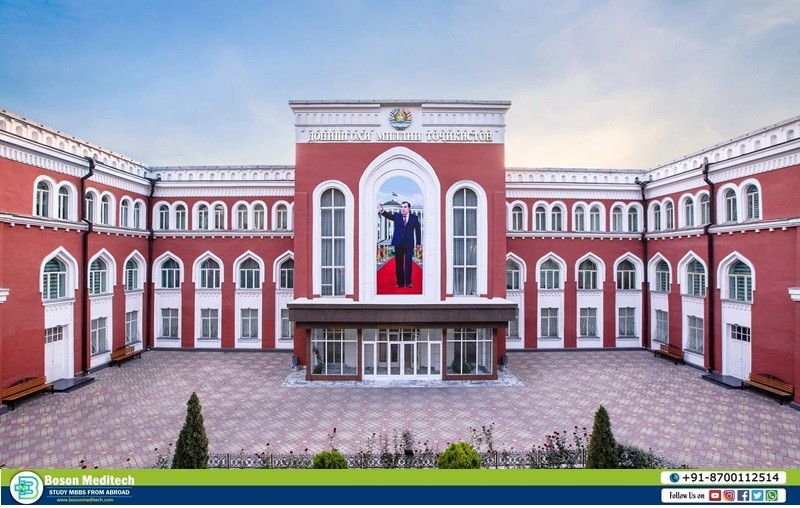
Program Duration
Tajik National University’s MBBS program spans six years. This timeline is meticulously designed to equip students with the knowledge, skills, and clinical acumen necessary to excel in the field of medicine. The six-year duration encompasses both theoretical learning and practical exposure, ensuring a well-rounded medical education.
Theoretical Learning
The MBBS curriculum at TNU covers a wide range of subjects, including basic sciences, pre-clinical studies, and clinical sciences. Students engage in comprehensive coursework in anatomy, physiology, biochemistry, pharmacology, pathology, microbiology, and community medicine. The theoretical foundation is crucial for understanding the complexities of human health and disease.
Practical Exposure
Practical training is a vital component of the MBBS program at TNU. Students participate in laboratory work, clinical rotations, and internships at affiliated hospitals and clinics. This hands-on experience allows students to apply their theoretical knowledge to real-world medical scenarios, honing their diagnostic and treatment skills.
Clinical Rotations
During the clinical phase, students rotate through various medical specialties, including internal medicine, surgery, pediatrics, obstetrics and gynecology, and psychiatry. These rotations provide invaluable insights into different medical fields and help students decide on their future specialization.
Tajik National University offers a robust MBBS program that prepares Indian students for successful careers in medicine. The six-year program combines rigorous theoretical learning with extensive practical training, ensuring that graduates are well-equipped to meet the challenges of the medical profession. For Indian students committed to a career in medicine, TNU provides a solid foundation for academic and professional success.
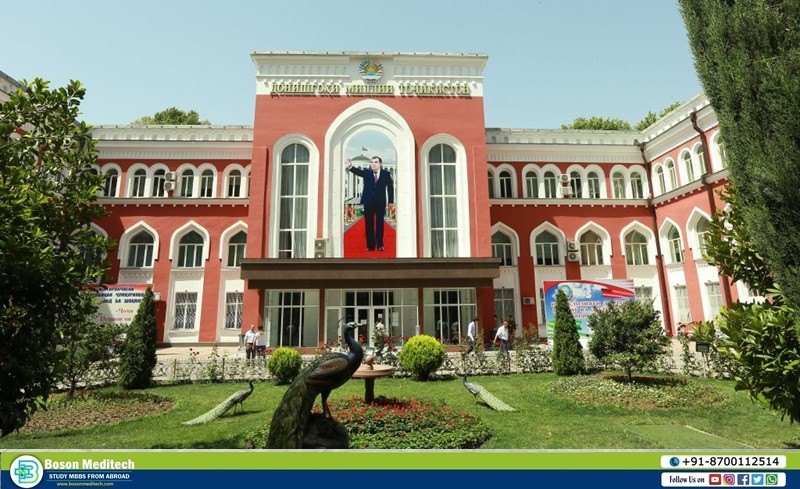
Eligibility Criteria for MBBS at Tajik National University for Indian Students
- Educational Qualifications:
Completion of 10+2 level of education with Physics, Chemistry, and Biology as compulsory subjects.
Minimum aggregate marks requirement typically ranges from 50% to 60%, depending on the university’s regulations.
Indian students must have passed the NEET (National Eligibility cum Entrance Test) with qualifying marks to be eligible for admission.
- Age Limit:
Generally, applicants must be at least 17 years old and not more than 25 years old at the time of admission.
Some universities may have slight variations in the age criteria, so it’s essential to check the specific requirements of Tajik National University. Call us at +91-8700112514.
Documents Required for Indian Students Applying to MBBS at Tajik National University
To apply for the MBBS program at Tajik National University, Indian students must prepare and submit the following documents:
- Marksheet 10th
- Marksheet 12th
- NEET Scorecard
- Medical Certificate
- Passport-sized Photographs
- Recent passport-sized photographs
- Valid passport with a minimum validity period of at least 6 months
Tajik National University Hostel Facility
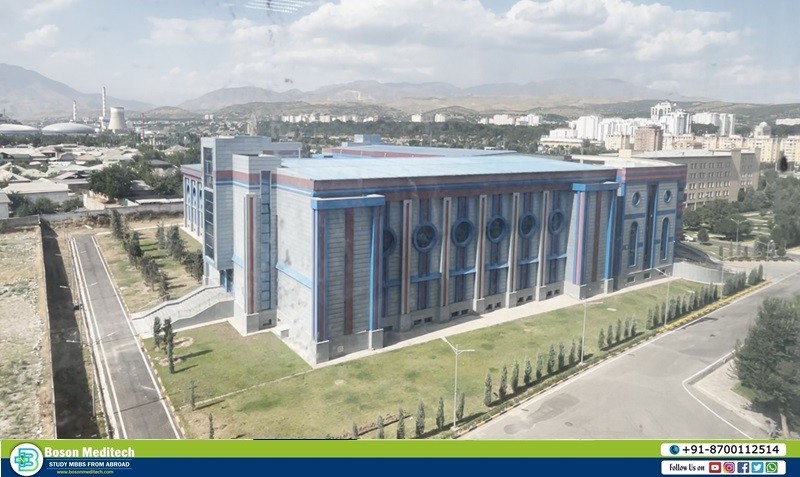
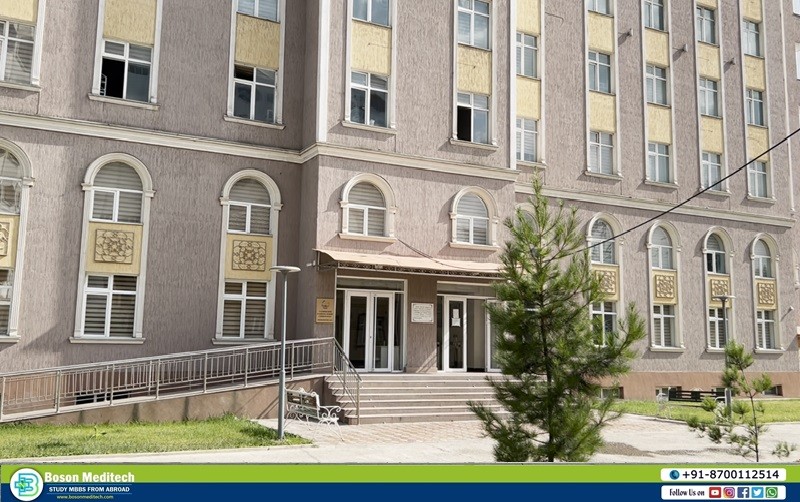

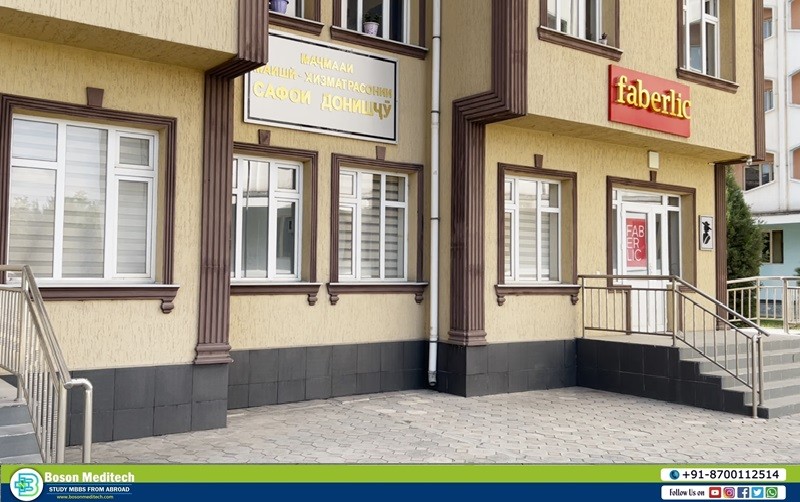
Tajik National University Hospital
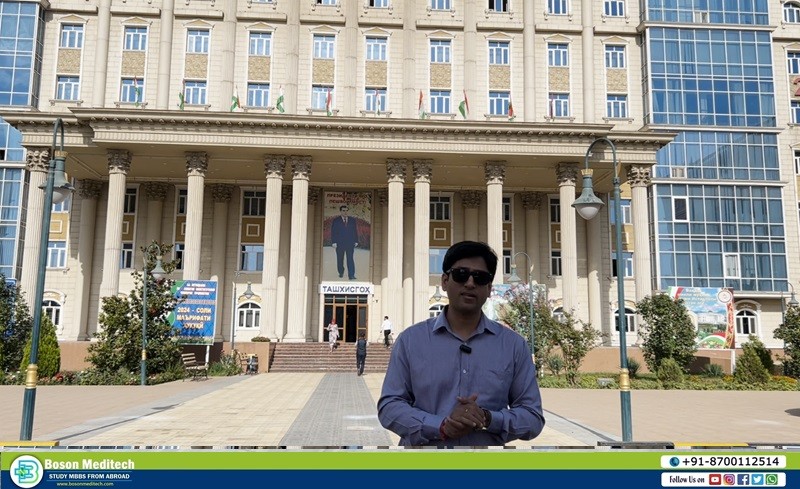
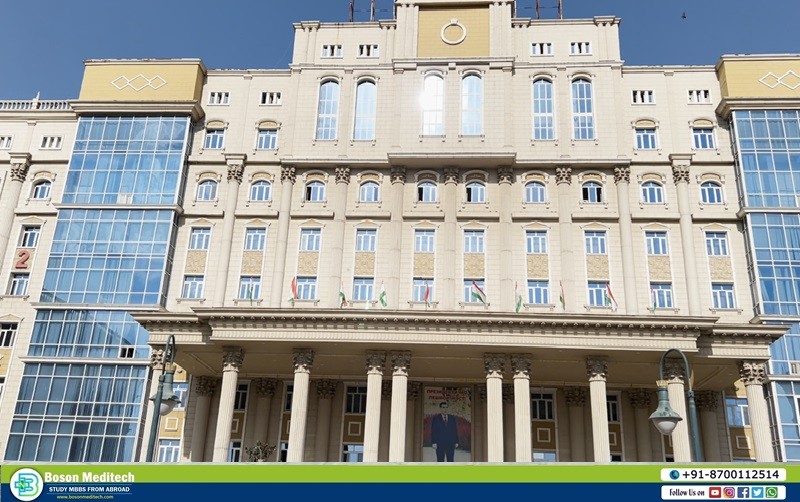
Syllabus of MBBS in Tajik National University for Indian Students
| Year | Subjects | Details |
| First | Anatomy | Introduction to the structure of the human body, including gross anatomy, histology, and embryology. |
| Physiology | Study of the normal functioning of the human body’s systems, including cardiovascular, respiratory, gastrointestinal, and nervous systems. | |
| Biochemistry | Introduction to the chemical processes and substances occurring within living organisms, with a focus on biomolecules, metabolism, and molecular biology. | |
| Second | Pathology | Study of the nature of diseases, including their causes, development, mechanisms, and consequences, with emphasis on both general pathology and systemic pathology. |
| Microbiology and Immunology | Introduction to microorganisms, including bacteria, viruses, fungi, and parasites, along with the body’s immune response to infections and immunological disorders. | |
| – Pharmacology | Study of drugs and their interactions with living organisms, encompassing pharmacokinetics, pharmacodynamics, therapeutics, and toxicology. | |
| Third | General Medicine | Comprehensive study of internal medicine, covering various medical conditions, diagnostic procedures, and treatment approaches. |
| General Surgery | Introduction to surgical principles and techniques, including pre-operative assessment, surgical procedures, and post-operative care. | |
| Obstetrics and Gynecology | Study of female reproductive health, including pregnancy, childbirth, and disorders of the female reproductive system. | |
| Fourth | Paediatrics | Examination and management of medical conditions affecting infants, children, and adolescents, including growth and development, common paediatric diseases, and preventive healthcare. |
| Psychiatry | Study of mental health disorders, their diagnosis, treatment, and management, as well as the psychological aspects of human behaviour. | |
| Forensic Medicine | Introduction to the application of medical knowledge to legal matters, including medical jurisprudence, forensic pathology, and toxicology. | |
| Fifth | – Ophthalmology | Study of diseases and disorders of the eye, including diagnosis, treatment, and surgical interventions. |
| Otorhinolaryngology (ENT) | Examination and management of disorders related to the ear, nose, and throat, including hearing loss, sinusitis, and tonsillitis. | |
| Community Medicine (Preventive and Social Medicine) | Comprehensive study of public health principles, epidemiology, biostatistics, and healthcare management, with a focus on disease prevention, health promotion, and community-based healthcare services. | |
| Sixth | Emergency Medicine | Introduction to the management of acute medical conditions and trauma in emergency settings, including triage, resuscitation, and stabilization procedures. |
| Radiology and Imaging | Study of medical imaging techniques, including X-rays, CT scans, MRI, and ultrasound, for the diagnosis and treatment of various medical conditions. | |
| Anaesthesiology | Principles and practice of anaesthesia administration for surgical procedures, pain management, and critical care settings. | |
| Elective Rotations (Internal Medicine, Surgery, Paediatrics) | Clinical rotations in various specialties, allowing students to gain hands-on experience and exposure to different medical fields under supervision. |
Cost of Living in Tajik National University for Indian students
| Category | Monthly Cost in Rupees |
| Accommodation | 8,000 – 12,000 INR |
| Food | 5,000 – 7,000 INR |
| Transportation | 1,500 – 2,500 INR |
| Utilities (Electricity, Water, Gas) | 1,500 – 2,000 INR |
| Internet | 500 – 1,000 INR |
| Study Materials/ Stationery | 1,000 – 2,000 INR |
| Health Insurance | 1,000 – 1,500 INR |
| Personal Expenses | 2,000 – 3,000 INR |
Faculties in Tajik National University for Indian Students
Faculty of Medicine
TNU’s Faculty of Medicine is renowned for its quality education and modern facilities.
Indian students have the opportunity to pursue undergraduate and postgraduate degrees in medicine.
The curriculum is designed to meet international standards and includes practical training in hospitals and clinics.
Faculty of Engineering
Indian students interested in engineering can enroll in various programs offered by the Faculty of Engineering.
The faculty emphasizes hands-on learning and research opportunities in collaboration with industry partners.
Faculty of Economics and Management
The Faculty of Economics and Management at TNU provides Indian students with a comprehensive education in business-related fields.
Programs cover areas such as finance, marketing, management, and international business.
Students benefit from experienced faculty members and internships with local and international companies.
Faculty of Humanities
Indian students with interests in humanities and social sciences can explore programs offered by the Faculty of Humanities.
Majors include history, literature, linguistics, anthropology, and sociology.
The faculty encourages critical thinking and research skills through seminars, workshops, and fieldwork.
Faculty of Law
TNU’s Faculty of Law offers Indian students the opportunity to study Tajik and international law.
The curriculum covers various legal disciplines, including constitutional law, criminal law, and human rights law.
Students engage in moot court competitions and internships to gain practical experience in legal practice.
Faculty of Natural Sciences
Indian students passionate about science can enroll in programs offered by the Faculty of Natural Sciences.
Majors include biology, chemistry, physics, mathematics, and environmental science.
The faculty emphasizes laboratory work and research projects to foster scientific inquiry and innovation.
Faculty of International Relations
The Faculty of International Relations caters to Indian students interested in diplomacy, geopolitics, and global affairs.
Programs cover topics such as international law, diplomacy, conflict resolution, and regional studies.
Students have the opportunity to participate in Model United Nations simulations and study abroad exchanges.
Faculty of Languages
TNU’s Faculty of Languages offers Indian students the chance to study Tajik, Russian, English, and other languages.
Language programs are tailored to meet the needs of students at different proficiency levels.
The faculty provides language immersion experiences and cultural activities to enhance language learning.
Faculty of Information Technology
Indian students interested in information technology can pursue programs offered by the Faculty of Information Technology.
Specializations include software engineering, cybersecurity, data science, and network administration.
The faculty emphasizes practical skills development through projects, internships, and industry certifications.
Faculty of Agriculture
The Faculty of Agriculture at TNU provides Indian students with opportunities to study agricultural science and technology.
Programs cover areas such as crop science, animal husbandry, agribusiness, and sustainable agriculture.
Students benefit from hands-on training at TNU’s research farms and collaboration with agricultural organizations.
Faculty of Arts and Design
The Faculty of Arts and Design at TNU offers Indian students the chance to explore their creative talents.
Programs encompass various artistic disciplines such as fine arts, graphic design, fashion design, and multimedia.
Students receive hands-on training in state-of-the-art studios and galleries, preparing them for careers in the creative industries.
Faculty of Architecture and Urban Planning
Indian students passionate about architecture and urban design can pursue programs offered by this faculty.
Curriculum covers architectural theory, design principles, urban planning, and sustainable development.
Students engage in studio projects, site visits, and internships to develop practical skills and address real-world design challenges.
Faculty of Education
The Faculty of Education prepares Indian students for careers in teaching and educational leadership.
Programs focus on pedagogy, curriculum development, educational psychology, and educational technology.
Students gain practical experience through teaching practicums and internships in schools and educational institutions.
Faculty of Psychology
Indian students interested in psychology can enroll in programs offered by the Faculty of Psychology.
Curriculum covers areas such as clinical psychology, counseling psychology, developmental psychology, and social psychology.
Students participate in hands-on research projects and practical training to develop counseling and therapeutic skills.
Faculty of Physical Education and Sports
The Faculty of Physical Education and Sports promotes healthy lifestyles and athletic excellence among Indian students.
Programs include sports science, exercise physiology, sports management, and coaching.
Students have access to modern sports facilities and opportunities to participate in competitive sports events.
Faculty of Tourism and Hospitality
Indian students with interests in tourism and hospitality can pursue programs offered by this faculty.
Curriculum covers tourism management, hotel management, event management, and culinary arts.
Students gain practical experience through internships in hotels, travel agencies, and event planning companies.
Faculty of Music and Performing Arts
The Faculty of Music and Performing Arts nurtures the artistic talents of Indian students.
Programs encompass music performance, music education, theater arts, and dance.
Students have access to rehearsal spaces, performance venues, and opportunities to collaborate with local artists.
Faculty of Communication Studies
The Faculty of Communication Studies equips Indian students with skills in media, journalism, and communication.
Programs cover areas such as mass communication, public relations, digital media, and broadcasting.
Students engage in hands-on projects and internships to develop communication strategies and media production skills.
Faculty of Environmental Studies
The Faculty of Environmental Studies addresses pressing environmental issues and sustainability challenges.
Indian students can study environmental science, environmental policy, natural resource management, and conservation biology.
Students participate in fieldwork, research projects, and internships to understand and address environmental problems.
Why MBBS in Tajikistan for Indian Students?
- Affordable Education:
One of the main reasons Indian students choose to study MBBS in Tajikistan is the cost-effectiveness. Tuition fees and living expenses in Tajikistan are significantly lower compared to many other countries offering medical education. This makes it an attractive option for students from middle-class backgrounds.
- Recognition by MCI
Several medical universities in Tajikistan are recognized by the Medical Council of India (MCI). This recognition allows Indian students who graduate from these universities to practice medicine in India after passing the necessary screening tests conducted by the MCI.
- English-Medium Instruction:
Most medical universities in Tajikistan offer MBBS programs in English. This benefits Indian students by eliminating the need to learn a new language and helps in better understanding of the curriculum.
- Quality of Education:
Despite the affordability, medical universities in Tajikistan provide quality education. They are equipped with modern infrastructure, laboratories, and experienced faculty members to ensure comprehensive medical training.
- International Exposure:
Studying in Tajikistan provides Indian students with the opportunity to experience a new culture and interact with peers from various countries. This exposure broadens their perspectives and prepares them to work in diverse healthcare environments.
- Clinical Experience:
Medical universities in Tajikistan emphasize practical training alongside theoretical learning. Students gain clinical experience through internships and rotations in hospitals, clinics, and other healthcare facilities.
- Safety and Security:
Tajikistan is known for its safety, with a low crime rate and a welcoming atmosphere. This makes it a comfortable place for Indian students to pursue their medical education without concerns about their safety.
- Cost of Living:
The cost of living in Tajikistan is significantly lower than in many Western countries. This includes expenses for accommodation, food, transportation, and leisure activities, allowing students to maintain a decent standard of living without financial strain.
- Easy Admission Process:
The admission process for MBBS programs in Tajikistan is relatively straightforward. The eligibility criteria are clear, and the documentation requirements are not overly complicated, making it easier for Indian students to secure admission.
- Globally Recognized Degree:
A medical degree from a recognized university in Tajikistan is valued internationally. Graduates can pursue further studies or employment opportunities not only in India but also in other countries around the world.
- Cultural Similarities:
Tajikistan shares cultural similarities with India, which can help Indian students adapt more easily to the new environment. The cuisine, festivals, and social customs have some resemblance to those in India, creating a sense of familiarity.
- Supportive Environment:
Many universities in Tajikistan offer support services for international students, including assistance with accommodation, visa support, and academic guidance. This ensures that students receive the necessary support throughout their academic journey.
- Exploration Opportunities:
Tajikistan’s scenic landscapes and historical sites provide opportunities for exploration during breaks or holidays. Students can immerse themselves in the country’s rich history and natural beauty, enhancing their overall experience.
- Networking Opportunities:
Studying in Tajikistan allows Indian students to build a network within the global medical community. Interactions with peers, faculty, and professionals during their studies can lead to future collaborations and career opportunities.
- Personal Growth:
Living and studying abroad fosters personal growth and independence. Students learn to adapt to new situations, overcome challenges, and become more self-reliant, which are valuable skills for their future professional and personal lives.
FAQs about MBBS in Tajik National University for Indian Students
-
What is MBBS?
MBBS (Bachelor of Medicine, Bachelor of Surgery) is an undergraduate medical degree awarded upon completing medical school, enabling graduates to practice as doctors.
-
Why choose Tajik National University for MBBS?
Tajik National University is recognized by the Medical Council of India (MCI), ensuring the MBBS program is valid and acceptable in India.
The university offers affordable tuition fees compared to Indian private medical colleges.
Tajikistan’s multicultural environment provides exposure to diverse medical cases, enhancing practical learning.
-
Is the MBBS degree from Tajik National University recognized worldwide?
Yes, the MBBS degree from Tajik National University is globally recognized, allowing graduates to practice medicine in various countries.
-
What is the eligibility criteria for Indian students?
Indian students must have completed 10+2 with Physics, Chemistry, and Biology as mandatory subjects.
They must also qualify NEET (National Eligibility cum Entrance Test) for admission.
-
What is the duration of the MBBS program at Tajik National University?
The MBBS program at Tajik National University lasts for 6 years, including one year of internship.
-
Is the medium of instruction English?
Yes, the medium of instruction for the MBBS program is English, making it accessible for international students, including Indians.
-
What are the admission procedures for Indian students?
Indian students need to fill out an application form available on the university’s website.
They must submit necessary documents such as academic transcripts, NEET scores, and passport copies.
Upon acceptance, students need to apply for a student visa to study in Tajikistan.
-
What are the accommodation options for Indian students?
Tajik National University offers comfortable hostel facilities for international students, including Indian students.
Hostels are equipped with modern amenities and provide a conducive environment for studying and living.
-
Is there any entrance exam for admission to Tajik National University?
No, there is no separate entrance exam for admission to Tajik National University’s MBBS program. However, Indian students must qualify NEET for eligibility.
-
What is the fee structure for the MBBS program?
The fee structure for the MBBS program is lower compared to private medical colleges in India.
Detailed fee information can be obtained from the university’s official website or admission office.
-
Are there any scholarship opportunities for Indian students?
Tajik National University offers scholarships based on academic merit and other criteria.
Candidates can inquire about scholarship opportunities during the admission process.
-
Is there any Indian community support available in Tajikistan?
Yes, there is an Indian community in Tajikistan that supports Indian students with cultural adaptation, accommodation, and networking.
-
What are the career prospects after completing MBBS from Tajik National University?
Graduates can pursue a medical career in India by clearing the Foreign Medical Graduates Examination (FMGE).
They can also opt for postgraduate studies or practice medicine in other countries, subject to licensing requirements.
-
Is it safe for Indian students to study in Tajikistan?
Tajikistan is generally considered safe for international students, including Indians.
Students should exercise caution and follow safety guidelines provided by the university and local authorities.
-
Can Indian students practice medicine in India after completing MBBS from Tajik National University?
Yes, Indian students can practice medicine in India after completing MBBS from Tajik National University by passing the required licensing exams like FMGE.
-
What is the quality of education and faculty at Tajik National University?
Tajik National University has highly qualified and experienced faculty dedicated to providing quality education.
The university follows a modern curriculum and uses innovative teaching methods to ensure comprehensive medical training.
-
What medical facilities are available for practical training?
The university has well-equipped laboratories, hospitals, and clinics for practical training.
Students gain hands-on experience in various medical disciplines under the guidance of experienced professionals.
-
Are there any cultural differences that Indian students should be aware of?
Indian students may encounter cultural differences in language, customs, and traditions.
Respecting and being open-minded towards local culture is essential for adaptation.
-
Can students pursue internships or clinical rotations in India during their MBBS program?
Some students may pursue internships or clinical rotations in India, subject to approval from both Tajik National University and Indian institutions.
This provides additional clinical experience and exposure to medical practices in India.
-
What support services are available for international students?
Tajik National University offers support services including orientation programs, counseling, and academic advising.
Dedicated staff assist with administrative processes, accommodation, and other logistical matters.
-
Can students participate in extracurricular activities and cultural events?
Yes, the university encourages participation in extracurricular activities and cultural events.
Students can engage in sports, clubs, cultural celebrations, and academic competitions.
-
What is the climate like in Tajikistan, and how should students prepare?
Tajikistan has a continental climate with hot summers and cold winters.
Students should pack appropriate clothing for both warm and cold weather and prepare for seasonal changes.
-
Are there opportunities for research and academic collaborations?
The university promotes research activities and encourages students to participate in research projects and academic collaborations.
Students can collaborate with faculty on research initiatives and present their findings at conferences and symposiums.

